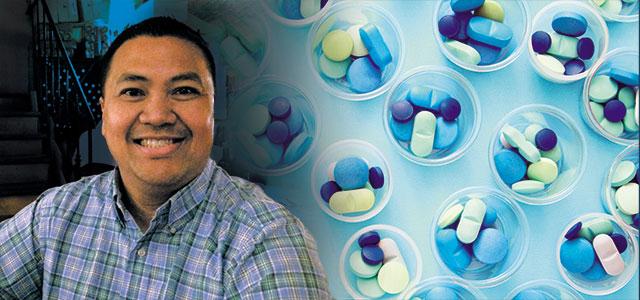
Ilufredo Tantoy, PhD in Nursing student
A Different Kind of Nurse: Ilufredo Tantoy Looks at a Future in Pharmaceutical Research
If you Google the word “nurse,” the first results describe someone who provides care for the sick or infirm. For most of us, the word conjures images of a person taking care of patients in a hospital or clinic, but, of course, there’s far more to the science of nursing care.
“Nurses wear many hats,” says Ilufredo (Fred) Tantoy, a PhD student in the UCSF School of Nursing’s Department of Physiological Nursing, whose career has followed an unusual path from bench to bedside and back again.
From Bench to Bedside
Tantoy began his career in the pharmaceutical industry, first as a research associate for Takeda Pharmaceuticals’ North American branch, then for Neopharm, managing their clinical pharmacy program. He worked with physicians and sponsors, gathering documentation and ensuring that research teams’ work met regulatory requirements. He enjoyed these activities but wanted to participate more deeply in the research. “I decided I needed a nursing background in order to make more of an impact,” he says. “I wanted to pursue a career that would allow me to be an active clinical participant in research studies and have the knowledge and skills to evaluate the impact or outcome of these studies on current patient care.”
He got his BSN from Loyola University Chicago’s Marcella Niehoff School of Nursing and worked as a clinical nurse in the hematology/oncology unit at the University of Michigan Health System. There, he observed patients receiving state-of-the-art care for their disease while still suffering from their symptoms, which were often made worse by the side effects of treatment.
“Patients were constantly saying, ‘I’m fatigued; I’m still feeling the pain,’” says Tantoy. “It seemed like medicine should be answering these questions, but it wasn’t.” His background in pharmaceutical research convinced him that more could be done. “We were developing these really novel targeted therapies, yet we were still seeing patients have the same symptoms we thought we were going to get rid of.”
Developing Expertise in Developing Drugs
Anxious to contribute to the development of drugs that could ameliorate distressing symptoms and improve patients’ quality of life as well as their outcomes, Tantoy pursued a master’s in nursing research management at George Washington University. He continued to work for pharmaceutical companies, which brought him to the San Francisco Bay Area, where he worked for BioMarin Pharmaceutical and then Genentech (part of the Roche Group), where he was the company’s associate director and regional head for its auditing department, ensuring regulatory compliance in its clinical trials.
Tantoy completed his master’s and continued to develop his expertise in compliance and good clinical practice (GCP), working for Genentech and Onyx Pharmaceuticals. As his reputation has grown, he began to consult for other pharmaceutical companies and is regularly invited to speak at conferences and on panels.
At the same time, his interest in the science of symptomatology grew, and last year he entered the School’s PhD program, where he came under the wing of Christine Miaskowski, Sharon A. Lamb Endowed Chair of Physiological Nursing and a well-known researcher in the field of symptomatology. “She’s given me a lot of guidance,” says Tantoy. “She has a major study going on right now that I’m participating in and collecting data for.”
Working on Research from the Ground Up
Tantoy’s doctoral research looks at the symptom experience of patients receiving targeted therapy for colorectal cancer. While he came to his doctoral work with a great deal of previous experience working on clinical trials, building a project from the planning stages is new. “I’m seeing the whole thing from a new perspective. This is the first time I’m actually getting my hands on [a study’s design] and seeing how it is from the ground floor,” he says. Planning a study and recruiting and working with subjects present new challenges for someone who has spent much of his career advising other scientists and reviewing their work. “I used to hear about how difficult the work was, and how hard it was to meet aggressive deadlines. I have a new appreciation for it now,” he says.
While it may seem a far cry from “traditional” nursing, pharmaceutical research is the essence of the science of caring, and Tantoy would like more people to understand this. “People joke about working for pharmaceutical companies as ‘going to the dark side,’ but I see what it has to offer,” he says. Envisioning the potential of every step – from an initial feasibility study to analyzing the data from a clinical trial – keeps Tantoy focused on his goals. “At the end, we’re all looking at the patients and putting them first.”



